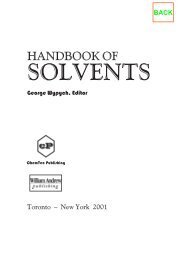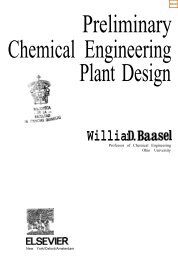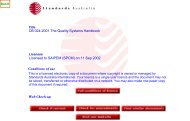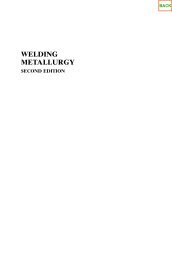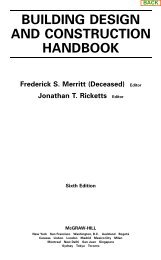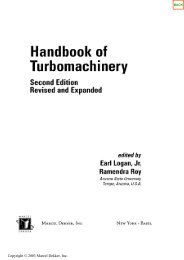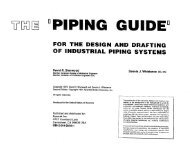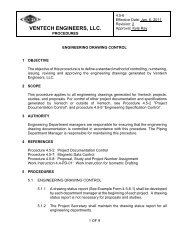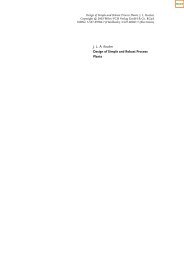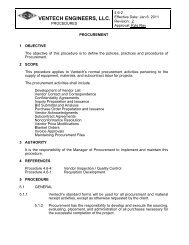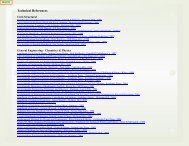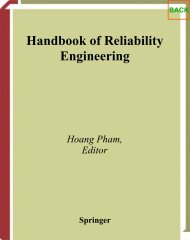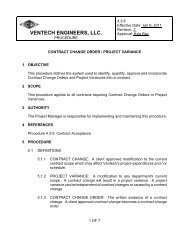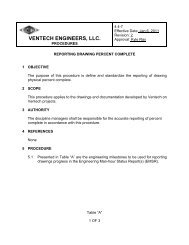fundamentals of engineering supplied-reference handbook - Ventech!
fundamentals of engineering supplied-reference handbook - Ventech!
fundamentals of engineering supplied-reference handbook - Ventech!
You also want an ePaper? Increase the reach of your titles
YUMPU automatically turns print PDFs into web optimized ePapers that Google loves.
Engineering is considered to be a "pr<strong>of</strong>ession" rather than an<br />
"occupation" because <strong>of</strong> several important characteristics<br />
shared with other recognized learned pr<strong>of</strong>essions, law,<br />
medicine, and theology: special knowledge, special privileges,<br />
and special responsibilities. Pr<strong>of</strong>essions are based on<br />
a large knowledge base requiring extensive training. Pr<strong>of</strong>essional<br />
skills are important to the well-being <strong>of</strong> society. Pr<strong>of</strong>essions<br />
are self-regulating, in that they control the training<br />
and evaluation processes that admit new persons to the field.<br />
Pr<strong>of</strong>essionals have autonomy in the workplace; they are<br />
expected to utilize their independent judgment in carrying<br />
out their pr<strong>of</strong>essional responsibilities. Finally, pr<strong>of</strong>essions<br />
are regulated by ethical standards. 1<br />
The expertise possessed by engineers is vitally important to<br />
public welfare. In order to serve the public effectively, engineers<br />
must maintain a high level <strong>of</strong> technical competence.<br />
However, a high level <strong>of</strong> technical expertise without adherence<br />
to ethical guidelines is as much a threat to public welfare<br />
as is pr<strong>of</strong>essional incompetence. Therefore, engineers<br />
must also be guided by ethical principles.<br />
The ethical principles governing the <strong>engineering</strong> pr<strong>of</strong>ession<br />
are embodied in codes <strong>of</strong> ethics. Such codes have been<br />
adopted by state boards <strong>of</strong> registration, pr<strong>of</strong>essional <strong>engineering</strong><br />
societies, and even by some private industries. An<br />
example <strong>of</strong> one such code is the NCEES Rules <strong>of</strong> Pr<strong>of</strong>essional<br />
Conduct, found in Section 240 <strong>of</strong> Model Rules and<br />
presented here. As part <strong>of</strong> his/her responsibility to the public,<br />
an engineer is responsible for knowing and abiding by<br />
the code. Additional rules <strong>of</strong> conduct are also included in<br />
Model Rules.<br />
The three major sections <strong>of</strong> the model rules address (1) Licensee's<br />
Obligation to Society, (2) Licensee's Obligation to<br />
Employers and Clients, and (3) Licensee's Obligation to<br />
Other Licensees. The principles amplified in these sections<br />
are important guides to appropriate behavior <strong>of</strong> pr<strong>of</strong>essional<br />
engineers.<br />
Application <strong>of</strong> the code in many situations is not controversial.<br />
However, there may be situations in which applying the<br />
code may raise more difficult issues. In particular, there may<br />
be circumstances in which terminology in the code is not<br />
clearly defined, or in which two sections <strong>of</strong> the code may be<br />
in conflict. For example, what constitutes "valuable consideration"<br />
or "adequate" knowledge may be interpreted differently<br />
by qualified pr<strong>of</strong>essionals. These types <strong>of</strong> questions<br />
are called conceptual issues, in which definitions <strong>of</strong> terms<br />
may be in dispute. In other situations, factual issues may<br />
also affect ethical dilemmas. Many decisions regarding <strong>engineering</strong><br />
design may be based upon interpretation <strong>of</strong> disputed<br />
or incomplete information. In addition, trade<strong>of</strong>fs revolving<br />
around competing issues <strong>of</strong> risk vs. benefit, or<br />
safety vs. economics may require judgments that are not<br />
fully addressed simply by application <strong>of</strong> the code.<br />
ETHICS<br />
99<br />
No code can give immediate and mechanical answers to all<br />
ethical and pr<strong>of</strong>essional problems that an engineer may face.<br />
Creative problem solving is <strong>of</strong>ten called for in ethics, just as<br />
it is in other areas <strong>of</strong> <strong>engineering</strong>.<br />
Model Rules, Section 240.15, Rules <strong>of</strong> Pr<strong>of</strong>essional Conduct<br />
A. LICENSEE’S OBLIGATION TO SOCIETY<br />
1. Licensees, in the performance <strong>of</strong> their services for<br />
clients, employers, and customers, shall be cognizant<br />
that their first and foremost responsibility is to the<br />
public welfare.<br />
2. Licensees shall approve and seal only those design<br />
documents and surveys that conform to accepted<br />
<strong>engineering</strong> and surveying standards and safeguard<br />
the life, health, property, and welfare <strong>of</strong> the public.<br />
3. Licensees shall notify their employer or client and<br />
such other authority as may be appropriate when<br />
their pr<strong>of</strong>essional judgment is overruled under<br />
circumstances where the life, health, property, or<br />
welfare <strong>of</strong> the public is endangered.<br />
4. Licensees shall be objective and truthful in<br />
pr<strong>of</strong>essional reports, statements, or testimony. They<br />
shall include all relevant and pertinent information in<br />
such reports, statements, or testimony.<br />
5. Licensees shall express a pr<strong>of</strong>essional opinion<br />
publicly only when it is founded upon an adequate<br />
knowledge <strong>of</strong> the facts and a competent evaluation <strong>of</strong><br />
the subject matter.<br />
6. Licensees shall issue no statements, criticisms, or<br />
arguments on technical matters which are inspired or<br />
paid for by interested parties, unless they explicitly<br />
identify the interested parties on whose behalf they<br />
are speaking and reveal any interest they have in the<br />
matters.<br />
7. Licensees shall not permit the use <strong>of</strong> their name or<br />
firm name by, nor associate in the business ventures<br />
with, any person or firm which is engaging in<br />
fraudulent or dishonest business or pr<strong>of</strong>essional<br />
practices.<br />
8. Licensees having knowledge <strong>of</strong> possible violations<br />
<strong>of</strong> any <strong>of</strong> these Rules <strong>of</strong> Pr<strong>of</strong>essional Conduct shall<br />
provide the board with the information and<br />
assistance necessary to make the final determination<br />
<strong>of</strong> such violation.<br />
1. Harris, C.E., M.S. Pritchard, & M.J. Rabins, Engineering Ethics: Concepts and<br />
Cases, Copyright © 1995 by Wadsworth Publishing Company, pages 27–28



